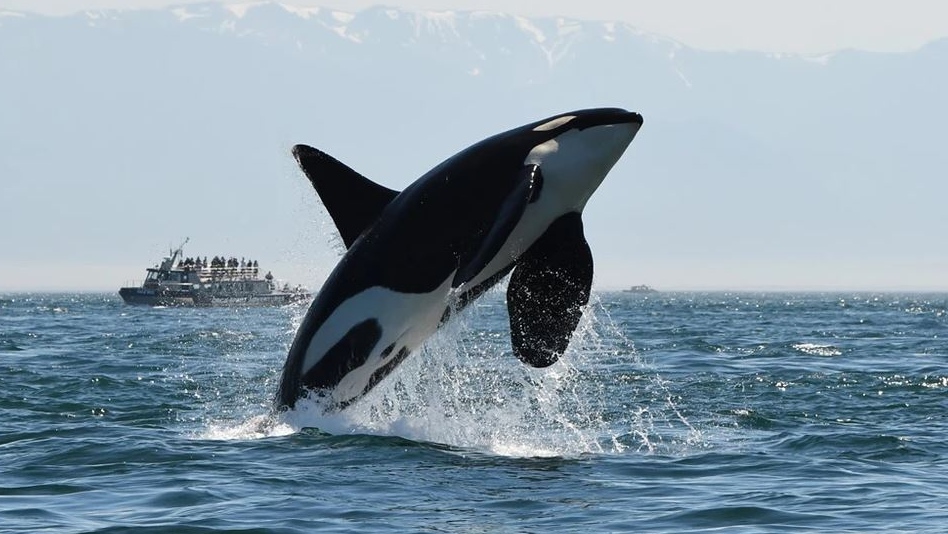Endangered orcas suffered calorie deficit in recent years: UBC study
 Southern resident orca K25 is seen in mid-breach. Researchers now fear the killer whale is one of three endangered southern residents that have died. (Dave Ellifrit/Center for Whale Research)
Southern resident orca K25 is seen in mid-breach. Researchers now fear the killer whale is one of three endangered southern residents that have died. (Dave Ellifrit/Center for Whale Research)
A new study released by the University of British Columbia found that southern resident killer whales (SRKW) did not have enough to eat in recent years, which correlates to higher mortality and lower fertility rates.
The study tracked the critically endangered SRKWs over the past 40 years, and found that they did not get enough to eat in six of those 40 years – three of which occurred in the most recent years of the study, from 2018 to 2020.
On average, adult killer whales were about 28,716 calories short in their diet in the six years that deficits were recorded, or about 17 per cent of their average daily energy requirements, according to the study.
"With the southern resident population at such a low level, there’s a sense of urgency to this kind of research," said lead author Fanny Couture, a doctoral student at the Institute for the Oceans and Fisheries (IOF) and Ocean Wise, in a release Monday.
As of October 2021, the SRKW population numbered about 73 orcas.
CHINOOK SALMON DECLINES
The southern residents feed mostly on Chinook salmon, and when Chinook salmon populations declined, the orcas were affected, the study found.
"The years where southern residents were in an energy deficit are also years where other studies report lower population growth rate and higher mortality rates for the killer whales," said Dr. Villy Christensen, professor at IOF and co-author of the study.
Researchers are uncertain why Chinook salmon populations are declining, though there are several factors, including climate change, disease, and predation by other animals.
Commercial fishing also plays a role, though researchers say Chinook salmon harvesting was reduced in Canada in the late 1990s, and that salmon declines have continued over the past two decades.
"Those declines have continued despite severe fisheries reductions, and one very likely candidate for causing them is the massive increase in abundance of Steller sea lions since the mid-1980s; those sea lions now consume more fish than all the B.C. commercial fisheries for all species, combined," said Dr. Carl Walters, senior author of the study and retired professor at IOF.
MORE FISHING RESTRICTIONS MAY BE NEEDED
Researchers found that when Chinook salmon populations were particularly low, southern resident killer whales would feed on other types of salmon, such as chum. However, their energy deficits would still occur.
Study co-authors say more restrictions on Chinook salmon fishing may still be required to protect both the fish and the orcas, as well as further research into underwater noise pollution.
"Both killer whales and Chinook salmon, the southern resident’s main prey, are important, iconic species for the west coast of Canada," said Couture
"Studying what is happening to the population may help offer solutions, both for the southern residents and potentially other killer whale populations in the future."
CTVNews.ca Top Stories

Widow looking for answers after Quebec man dies in Texas Ironman competition
The widow of a Quebec man who died competing in an Ironman competition is looking for answers.
Tom Mulcair: Park littered with trash after 'pilot project' is perfect symbol of Trudeau governance
Former NDP leader Tom Mulcair says that what's happening now in a trash-littered federal park in Quebec is a perfect metaphor for how the Trudeau government runs things.
World seeing near breakdown of international law amid wars in Gaza and Ukraine, Amnesty says
The world is seeing a near breakdown of international law amid flagrant rule-breaking in Gaza and Ukraine, multiplying armed conflicts, the rise of authoritarianism and huge rights violations in Sudan, Ethiopia and Myanmar, Amnesty International warned Wednesday as it published its annual report.
Photographer alleges he was forced to watch Megan Thee Stallion have sex and was unfairly fired
A photographer who worked for Megan Thee Stallion said in a lawsuit filed Tuesday that he was forced to watch her have sex, was unfairly fired soon after and was abused as her employee.
Amid concerns over 'collateral damage' Trudeau, Freeland defend capital gains tax change
Facing pushback from physicians and businesspeople over the coming increase to the capital gains inclusion rate, Prime Minister Justin Trudeau and his deputy Chrystia Freeland are standing by their plan to target Canada's highest earners.
U.S. Senate passes bill forcing TikTok's parent company to sell or face ban, sends to Biden for signature
The Senate passed legislation Tuesday that would force TikTok's China-based parent company to sell the social media platform under the threat of a ban, a contentious move by U.S. lawmakers that's expected to face legal challenges.
Wildfire southwest of Peace River spurs evacuation order
People living near a wildfire burning about 15 kilometres southwest of Peace River are being told to evacuate their homes.
U.S. Senate overwhelmingly passes aid for Ukraine, Israel and Taiwan with big bipartisan vote
The U.S. Senate has passed US$95 billion in war aid to Ukraine, Israel and Taiwan, sending the legislation to President Joe Biden after months of delays and contentious debate over how involved the United States should be in foreign wars.
'My stomach dropped': Winnipeg man speaks out after being criminally harassed following single online date
A Winnipeg man said a single date gone wrong led to years of criminal harassment, false arrests, stress and depression.
































